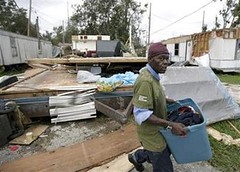
A man walking through damage from Hurricane Gustav which hit New Orleans and other parts of the Gulf and the southern United States on Monday, Sept. 1, 2008. Damage was far less than what was feared.
Originally uploaded by Pan-African News Wire File Photos
David Smith in New Orleans
The Guardian,
Tuesday September 2 2008
New Orleans residents brave the strong winds and rain Hurricane Gustav announced itself to New Orleans with a colossal black cloud and a sudden howl of wind and rain. Men on Canal Street leaned into it with their ties flying comically behind, then scrambled for shelter. They knew Gustav was merely clearing its throat.
Early yesterday power was going out all over the city, slowly strangling communication with the outside world. Those who stayed behind were left to rely on candles, torches and whatever food they had stocked up.
Police tuned in to battery-powered radios which suggested that flood defences were performing well. But with landlines dead and mobile networks shaky, the average person was no better off than a caveman watching the skies and hoping for the best.
The city remained under police curfew as the rain hammered incessantly, often in downpours accompanied by terrific gusts of wind and rain. The elegant streets of the main tourist district, the French Quarter, were deserted save for a few American TV reporters in macs.
Most buildings were padlocked and boarded up. A few hotels remained open for police, private security and media, but were shrouded in gloom due to lack of electricity.
The only traffic was an occasional police car or armoured vehicle containing National Guard soldiers, a likelier sight on the streets of Baghdad than the Big Easy.
But by the middle of the day, it seemed Gustav would not be as severe as predicted. Water poured over the levees, pushed by the wind, but they held, and it looked as though New Orleans would escape the catastrophic flooding of three years ago.
But for the towns and cities to the west, such as Lafayette and Baton Rouge, the warnings remained dire. Bobby Jindal, Louisiana's governor, said cataclysmic flooding could still be brought by the tail end of the hurricane which by last night had weakened in strength to category 1.
There are also threats from other storms developing in the Atlantic Ocean. The US National Hurricane Centre said tropical storm Hanna had become a hurricane with 75mph winds near the south-eastern Bahamas. Following on behind Hanna, tropical storm Ike, the ninth of a busy Atlantic hurricane season, formed on Monday midway between Africa and the Caribbean and was expected to grow rapidly into a hurricane that could threaten the US or the Caribbean.
In New Orleans about 10,000 residents are thought to have ignored the call to flee the city. The New Orleans mayor, Ray Nagin, had warned anybody looting they would go directly to jail.
All was not quite dead. Johnny White's sports bar ("We never close") had stayed open during Hurricane Katrina and was determined to do the same again. For those who had stayed, gambling that the French Quarter is relatively safe on high ground, it became a focal point yesterday for camaraderie and blitz spirit. "Help, it's the apocalypse, save us all, send dollars!" shouted one customer.
Another, Mike Wood, 46, who is homeless, chimed in: "Wait, send some marijuana, man." He said simply: "If you want the truth, I don't have anywhere else to go. I've been here all night and I'm going to stay here all day."
As the alcohol flowed, the gathering broke into a rowdy chorus of Swing Low, Sweet Chariot. Loori Marun, 40, working behind the bar, said she believed a hundred people had already been in that morning. "We said we'd never close and we just didn't. This is a place where people come if they don't know what's going on. It's about information - and drinking too, of course." Angel Rivero, 46, was in the bar because she did not want to leave behind her five cats or her miniature pinscher dog, Fawn. She said: "The evacuation has been much better organised this time but I don't agree with Nagin scaring people."
She said Gustav would inevitably come as another blow to the local economy. "The city hasn't recovered from Katrina. It's been getting better and I have a tourist company which was just about getting back on its feet when this happened. Now I might need to do another job - maybe disaster tourism."
Across the Mississippi, in Algiers Point, James Lewis, a Briton, was hunkered down at the Crown and Anchor pub, which he owns, with a Sky News TV crew. He said: "It got a bit hairy at about 5.30 this morning with the wind and rain. It's definitely not as bad now, but never say never. It's still a ghost town."
In the absence of official shelters in the city, residents said they were helping each other. Nicholas Wilbratt, owner of The Old Coffee Pot restaurant, said: "This hurricane's different. There's no convention centre, no Dome, and the governor said you're on your own. But we're here for each other. If people didn't stock up on water, we'll help them out."
No comments:
Post a Comment